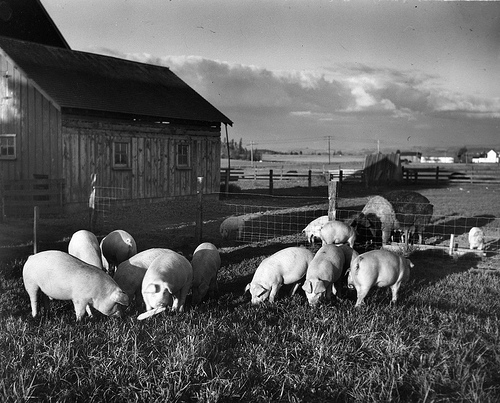
- Pigs that eat genetically modified foods have less inflammation than pigs that eat normal- the opposite of what the news reported
Pigs and GMO
So you read the headlines, or the news article and you see that pigs fed GMO had more stomach problems than pigs that were not fed GMO. Except that isn’t really what the article results show.
So you read the headlines, or the news article and you see that pigs fed GMO had more stomach problems than pigs that were not fed GMO. Except that isn’t really what the article results show.
The results show that pigs have a lot of stomach problems- regardless of the stuff that is fed to them.
From Table 3 of their study:
From Table 3 of their study:
Pigs who were fed non GM foods had more erosions, more pin point ulcers than pigs fed GM foods.
(1) Of all ulcers there were equal numbers in both GM fed and non GM fed pigs.
(2) In terms of inflammation – all types – there were 69 in the non GM fed group and 64 in the GM group.
(3) If you look at nil inflammation (meaning zip) – pigs who ate genetically modified foods had much less inflammation than pigs who ate "organic" food.
(4) If you add the "nil inflammation" the numbers are 73 with inflamed stomachs of pigs who ate non genetically modified foods and 72 pigs who ate genetically modified foods had inflamed stomachs.
(1) Of all ulcers there were equal numbers in both GM fed and non GM fed pigs.
(2) In terms of inflammation – all types – there were 69 in the non GM fed group and 64 in the GM group.
(3) If you look at nil inflammation (meaning zip) – pigs who ate genetically modified foods had much less inflammation than pigs who ate "organic" food.
(4) If you add the "nil inflammation" the numbers are 73 with inflamed stomachs of pigs who ate non genetically modified foods and 72 pigs who ate genetically modified foods had inflamed stomachs.
As a surgeon, who does a lot of stomach surgery – I would say that this study shows really no difference between the two groups of pigs- but when it comes to the severe issues there appear to be a lot more severe issues among the pigs that ate non-genetically modified food than the pigs that ate genetically modified foods.
What does this whole thing prove:
(1) GM and non GM are no different
(2) Pigs have a lot of stomach problems – who knew
(3) Journalists don’t read papers and analyze them, they instead read abstracts where the comments may not equal the results
(1) GM and non GM are no different
(2) Pigs have a lot of stomach problems – who knew
(3) Journalists don’t read papers and analyze them, they instead read abstracts where the comments may not equal the results
It is sad that the Journal of Organic Systems – which says it is peer reviewed, but its agenda is not science, its agenda is organic farming and systems. A fine agenda, but when you allow the abstract and conclusion to read the way they did - you simply decrease the value of your journal.
As for you journalists out there - try reading and analyzing the data before reporting it.
No comments:
Post a Comment